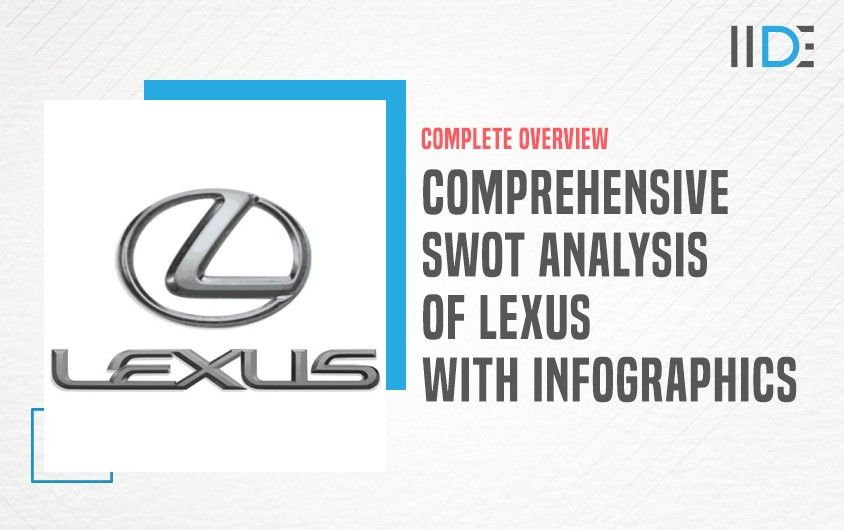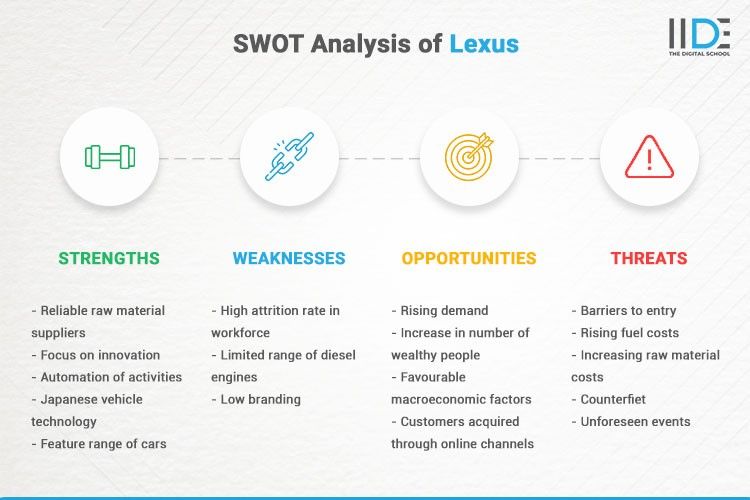
Orginally Written by Aditya Shastri
Updated on Aug 9, 2025
Share on:
In our previous blog, we had done an in-depth SWOT Analysis of the world’s 5th largest automotive brand, Hyundai. Here we will be discussing the SWOT Analysis of Lexus.
Lexus, as one of the world’s leading premium car manufacturers. It is one of the most popular luxury car brands in the world. It is also one of the world’s most valuable luxury car brands. In its home country of Japan, it is currently the top seller and market leader in the luxury segment.
It has gained such a large presence in the market with some of the market’s best marketing skills. It has used digital marketing to target its customers by filtering and reducing it to the most potential buyers. As most people are using digital media nowadays it is easy to find your target audience. If you are interested in learning what digital marketing is and how to use it to your advantage – check out our Free MasterClass on Digital Marketing 101 by the CEO and Founder of IIDE, Karan Shah.
Thus this makes us keen to know how Lexus maintains a prominent position in the market. To understand that we have given a Comprehensive SWOT Analysis of Lexus. But before we start with its SWOT Analysis let us learn about Lexus as a Company, its products, competitors, financials, and more.
About Lexus

Lexus is the luxury car division of Toyota Motors Pvt Ltd, which is headquartered in Nagoya, Japan. It was founded in the year 1989 by Eiji Toyoda. Lexus has established a global presence in over 70 countries.
Lexus is one of the most successful companies in its field. It is ranked tenth among Japanese brands that have expanded into global operations, and it now offers sedans, convertibles, coupes, and SUVs.
Lexus is based in Japan, but it also has factories in Brussels, Belgium, and Texas. Lexus has also produced a number of hybrid vehicles. Lexus automobiles are created with expert craftsmanship and meticulous attention to detail, drawing inspiration from both traditional artisanship and cutting-edge engineering. This pursuit of perfection can be seen throughout the manufacturing process.
Quick Stats About Lexus
| Founder | Eiji Toyoda |
|---|---|
| Year Founded | 1989 |
| Origin | Nagoya, Japan |
| No. of Employees | 57,000 |
| Company Type | Subsidiary |
| Brand Value | $10.3 Billion (2020) |
| Annual Revenue | $22.1 Billion (2020) |
| Net Profit | $293 Million (2020) |
Products of Lexus
Lexus is one of the most well-known brands in the world. It has been providing its customers with some of the best products in the market. Following are some of the products that Lexus provides:
- Cars
- Trucks
- Automobile Parts
Close Competitors of Lexus
As we are aware, every brand or firm has its opponents. Below mentioned are the top competitors of Lexus:
- BMW
- Audi
- Mercedes-Benz
- Ferrari
- Jaguar
Now that we know about the company let us look at the SWOT Analysis of Lexus in the section below.
SWOT Analysis of Lexus

The SWOT Analysis framework assists Lexus in identifying its internal strategic factors like strengths and weaknesses, as well as external strategic factors like opportunities and threats. Swot analysis helps Lexus to analyze its position in the market and helps it improve.
Now let’s take a look at its SWOT Analysis by starting with the Strengths of Lexus.
Strengths of Lexus
Lexus, as one of the industry’s leading companies, possesses a number of advantages that enable it to thrive in the market. These advantages not only assist it in retaining market share in existing markets but also in expanding into new ones. Some of Lexus’s strengths are:
- Reliable raw material suppliers – The company has a strong network of dependable raw material suppliers, which allows it to bypass any supply chain bottlenecks.
- Focus on Innovation – Toyota has always prioritized innovation and has directed research in areas such as robot-driven cars, alternative energy vehicles, interconnected traffic and safety systems, and so on.
- Automation of activities – improved the consistency of Lexus products and enabled the company to scale up and scale down in response to market demand.
- Japanese Vehicle Technology – Japan has been a forerunner of in-vehicle technology, and Japanese cars are widely used around the world because they have superior design, high reliability, and adhere to stringent quality norms.
- Feature range of cars – Lexus has long been associated with automobiles that are rich in features, such as cutting-edge technology, excellent safety, high-end aesthetics, and extraordinarily smooth driving comfort, to name a few.
Weaknesses of Lexus
Weaknesses are areas where Lexus can improve. Strategy is about making choices, and weaknesses are areas where a company can improve using SWOT analysis to strengthen its competitive advantage and strategic positioning.
- The high attrition rate in the workforce – When compared to other organizations in the industry, there is a high rate of attrition in the workforce. Lexus has a higher attrition rate and must spend significantly more on employee training and development than its competitors. Late entry into the market: Toyota entered the luxury car market very late, after German and Italian brands had already established a strong market presence. Lexus had a critical flaw in this area.
- Limited range of diesel engines – In comparison to competitors, the Lexus range of diesel engines is limited. The GS has only one petrol engine variant. The main competitors of this variant, the E Class and the 5 series, have dual diesel engine options, namely a 4 and a 6 cylinder.
- Low branding – Despite the fact that luxury cars are not advertised in mainstream media, a significant amount of money is spent on promotions and product launches. In comparison to market leaders, Toyota ad spends on Lexus are low, resulting in insufficient mileage and visibility.
Opportunities for Lexus
Opportunities are avenues in the environment that surround the business that can be capitalized on to increase its returns. Some of the opportunities for Lexus are as follows:
- Rising demand – There is an increase in demand for luxury automobiles in emerging economies. As demand for luxury automobiles rises in developing countries, many European automakers are expanding rapidly into these markets.
- Increase in the number of wealthy people – There has been a significant increase in spendable income in countries such as India and China. In China, for example, the number of millionaires is expected to increase by 10% over the next two years.
- Favorable macroeconomic factors – In the Middle East and Asia, macroeconomic factors such as the unemployment index, inflation, savings, investment, and disposable income are all favorable to the purchase of luxury cars. Lowering the cost of transportation due to lower shipping prices can also lower the cost of Lexus’ products, providing an opportunity for the company to either boost its profitability or In order to gain market share, pass on the benefits to customers.
- Customers acquired through the online channel – The company has invested a significant amount of money in the online platform over the last few years. Lexus has gained a new sales channel as a result of this investment. In the coming years, the company can capitalize on this opportunity by better understanding its customers and meeting their needs through big data analytics.
Threats for Lexus
Environmental components that have the potential to limit a company’s growth are known as threats. Some of the threats for Lexus are:-
- barriers to entry – Today’s vehicle market has few significant entry barriers, resulting in increased competitiveness. With a strong presence of European firms like BMW, Mercedes Benz, and Audi in the luxury market for automobiles, there is tough rivalry today.
- Rising fuel costs – As gasoline prices rise, people are opting for alternative energy vehicles or green vehicles.
- Increasing raw material costs – The cost of raw materials such as steel is also rising rapidly, making pricing challenging for automakers.
- Counterfeit – Lexus’s product is also threatened by counterfeit and low-quality imitations, particularly in emerging and low-income regions.
- Unforeseen events – The demand for highly profitable products is seasonal, and any unforeseen event during the peak season could have a short – to medium-term impact on the company’s profitability.
The aforementioned points comprise the entire SWOT analysis of Lexus and give a detailed look at the company’s standing. Now let us conclude our learnings in the segment below.


Learn Digital Marketing for FREE


CONCLUSION
On the study on the SWOT Analysis of Lexus, we know that it is one of the leading luxury car manufacturers in the world. It has reliable raw material suppliers and a future range of cars. It has opportunities like rising demand and favorable economic conditions. It still has some flaws that stop its growth. There is a high attrition rate in the workforce and low branding. It faces problems from a few significant entry barriers and counterfeit in the market. These problems can be handled by improving its branding with the use of advanced digital marketing techniques which will it to gain a better position in the market.
Digital marketing is gaining popularity worldwide and is quickly becoming one of the most used marketing tools in every company moreover it has become a crucial part of every industry and business and not just a way or means to reach out to a wider audience. If you are interested in learning and upskilling, check out IIDE’s 3 Month Advanced Online Digital Marketing Course to know more.
If you would like to read such detailed analyses of companies, find more such insightful case studies on our IIDE Knowledge portal.
Thank you for taking the time to read this, and do share your thoughts on this case study in the comments section below.
Want to Know Why 2,50,000+ Students Trust Us?
Dive into the numbers that make us the #1 choice for career success

MBA - Level
Post Graduate in Digital Marketing & Strategy
Best For
Fresh Graduates
Mode of Learning
On Campus (Mumbai & Delhi)
Starts from
Mar 23, 2026
Duration
11 Months
Live & Online
Advanced Online Digital Marketing Course
Best For
Working Professionals
Mode of Learning
Online
Starts from
Mar 6, 2026
Duration
4-6 Months

Online
Professional Certification in AI Strategy
Best For
AI Enthusiasts
Mode of Learning
Online
Duration
5 Months

Offline
Undergraduate Program in Digital Business & Entrepreneurship
Best For
12th Passouts
Mode of Learning
On Campus (Mumbai)
Duration
3 Years
Recent Post
Aditya Shastri leads the Business Development segment at IIDE and is a seasoned Content Marketing expert. With over a decade of experience, Aditya has trained more than 20,000 students and professionals in digital marketing, collaborating with prestigious institutions and corporations such as Jet Airways, Godrej Professionals, Pfizer, Mahindra Group, Publicis Worldwide, and many others. His ability to simplify complex marketing concepts, combined with his engaging teaching style, has earned him widespread admiration from students and professionals alike.
Aditya has spearheaded IIDE’s B2B growth, forging partnerships with over 40 higher education institutions across India to upskill students in digital marketing and business skills. As a visiting faculty member at top institutions like IIT Bhilai, Mithibai College, Amity University, and SRCC, he continues to influence the next generation of marketers.
Apart from his marketing expertise, Aditya is also a spiritual speaker, often traveling internationally to share insights on spirituality. His unique blend of digital marketing proficiency and spiritual wisdom makes him a highly respected figure in both fields.